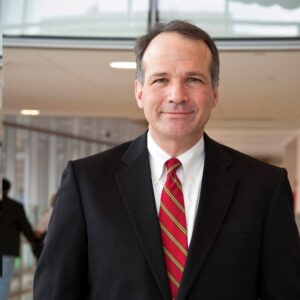“After a comprehensive national search, I am pleased to announce that Fredric Edward Wondisford, MD, MS, MBA, has been named dean of the University of Arizona College of Medicine – Phoenix, effective Oct. 2,” wrote Michael D. Dake, MD, Senior Vice President, University of Arizona Health Sciences. “Wondisford is an experienced clinician, professor and inventor with more than 30 years of experience in academic medicine and translational research. He joins the university from Rutgers University, where he is professor and chair of the Department of Medicine in the Robert Wood Johnson Medical School, the Henry Rutgers Chair and Chancellor Scholar at Rutgers Health. He is also chief of the Medical Service at the Robert Wood Johnson University Hospital, an RWJBarnabas Health facility.”

Fredric Edward Wondisford, MD, MS, MBA
(University of Arizona Health Sciences)
At Robert Wood Johnson Medical School, Wondisford expanded the Department of Medicine’s mentoring, teaching, clinical, research and community outreach activities while leading internal medicine care and teaching efforts at Robert Wood Johnson University Hospital.
His background in academic medicine, clinical integration and research growth are a perfect fit for the University of Arizona Health Sciences. And his experience in medical education innovation, as well as his vast research portfolio will lead the College of Medicine – Phoenix into a new era of distinction.
As a physician-researcher, Wondisford developed, patented and clinically launched Thyrogen®, a form of recombinant thyroid-stimulating hormone that changed the standard of care for patients with thyroid cancer. He has three patent applications pending for inventions related to diabetes and fatty liver disease and has been continuously funded by the National Institutes of Health since 1990. He successfully led NIH-funded P60 Diabetes Centers and T32 endocrinology training programs at the University of Chicago and Johns Hopkins University.
During his academic career, he has mentored 77 trainees, 40 of whom have gone on to obtain faculty appointments and develop independent research careers.
Before moving to Rutgers University, Wondisford was director of the Diabetes Institute at Johns Hopkins University, chief of the Endocrinology and Metabolism division at the University of Chicago, and chief of the Thyroid Unit at Beth Israel Deaconess Medical Center and Harvard University in Boston, in addition to other professorships.
A graduate of the Northeastern Ohio College of Medicine, Wondisford completed his internship and residency in internal medicine at University Hospitals of Cleveland and Case Western Reserve University Medical School in Cleveland, Ohio. He underwent additional training as an endocrinology research fellow at the National Institute of Diabetes and Digestive and Kidney Diseases, a division of the NIH.
Recently, he completed a Cornell University combined program resulting in Master of Science and Master of Business Administration degrees in health care policy, management and leadership with a special emphasis on academic strategy.
I would also like to take this opportunity to thank Guy Reed, MD, MS, for his leadership of the College of Medicine – Phoenix since 2017. Reed is a visionary leader who set a strategic vision for the College of Medicine – Phoenix to achieve excellence in personalized medical education to prepare students to become exceptional physicians. His work toward that goal has resulted in transformational changes to the college and its students.
Under his guidance, the college increased its class size from 80 to 120 medical students and admitted the most academically accomplished and diverse classes ever. Reed forged strong partnerships to develop clinical programs of distinction that foster education and research.
Reed will remain with the college in his faculty position to focus on his cardiovascular research, including an innovative, clot-dissolving therapy that is now in national clinical trials to treat patients with pulmonary embolism and ischemic stroke.
